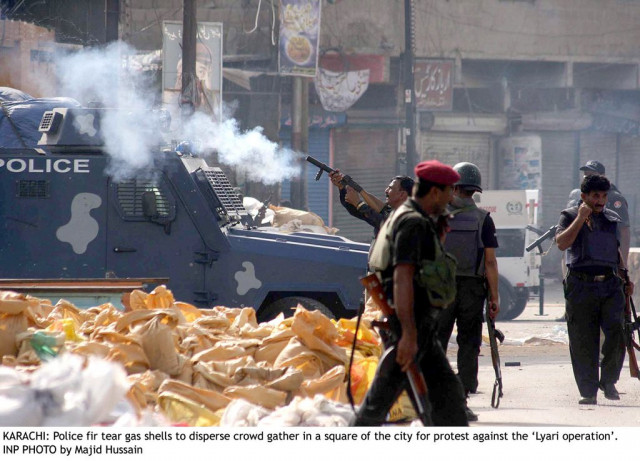Police failure
Law enforcers need to shift focus towards improving evidence-gathering mechanisms so that criminals are deterred.

Now is the time when the operation should have moved on to the next stage, in which the men arrested in the first phase are prosecuted. PHOTO: INP
Shamzai was just one of the several criminals arrested by the Rangers during a routine raid in Orangi Town. He was charged under the Explosives Act and for attempted murder but, since the police failed to gather enough evidence to prove these charges, he was let go. It was not until Shamzai was released that his true identity as chief of a militant group was revealed. Now the man is at large. Similarly, the arrest of two target killers in Lyari was declared a big breakthrough by the police in a press conference but those two suspects were also released a few days later due to lack of evidence.
Clearly, the investigation system followed by the law enforcement agencies leaves a lot to be desired. When the targeted operation began in September 2013, analysts pointed out that the law enforcers need proper strategy and action. They should have their targets labelled and their timeline marked. However, almost five months later, the police and Rangers are still harping about the number of arrests they make. Now is the time when the operation should have moved on to the next stage, in which the men arrested in the first phase are prosecuted. It is not until the criminals are given exemplary punishments that the law enforcers can claim that the operation is a success.
Merely adding to the number of arrests and raids is meaningless if these suspects keep getting released due to a lack of evidence. It is for this reason that the chief justice of Pakistan also rejected Karachi AIG Shahid Hayat’s report, which was presented during the Karachi violence suo motu hearing on February 24. Law enforcers need to shift focus towards improving evidence-gathering mechanisms so that criminals are deterred.
Published in The Express Tribune, February 28th, 2014.
Like Opinion & Editorial on Facebook, follow @ETOpEd on Twitter to receive all updates on all our daily pieces.



















COMMENTS
Comments are moderated and generally will be posted if they are on-topic and not abusive.
For more information, please see our Comments FAQ